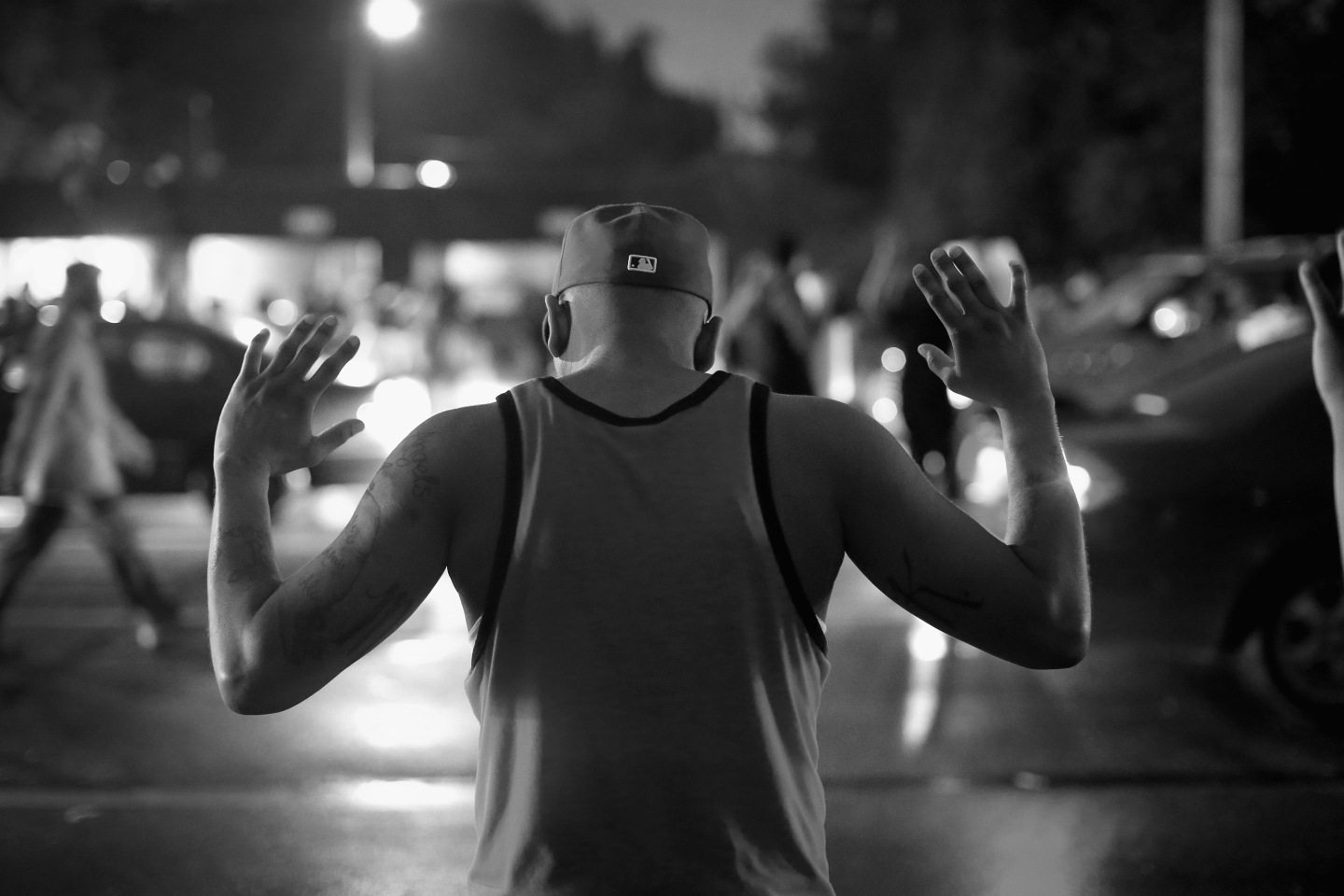The Erasure Of Black Life Is Unavoidable
The killing of Terence Crutcher affirms a reality I’m reminded of regularly in my neighborhood: there is a tenuous link between life and death for blacks.
 Scott Olson
Scott Olson
Two months ago, in the thick heat of a July summer night, I exited the Nostrand train stop in Bed-Stuy to the cries of a grizzled black man. He was homeless, his face a doughy dark mahogany against the Brooklyn twilight. He stood atop the steps, an impediment to escape from the city’s underground. “I want to die. I want to die,” he said, hard and certain. “I just want to die.”
He repeated this declaration four or five times, as if each new utterance might bring him closer. The despair in his avowal was made all the more disheartening because I knew there was nothing I could do to actually help him: money or food would not appease his request. He wanted release. He wanted to be at peace, gone from a world that asks so much of its black citizens and gives so little in return.
I don’t know how he came to stand on that corner on that night in those soiled, drab clothes. I don’t know what happened after I turned the corner and headed home, where shelter and comfort awaited me. The encounter happened at an intersection — Nostrand Avenue and Fulton Street — where the erasure of black residents has become a familiar, seemingly unalterable reality. Amid hair salons and barbershops, artisanal coffee shops and higher-priced restaurants have sprouted. Brownstones once bloated with the history of families who had absconded from the choke of the Jim Crow south have been gutted and remodeled, to become pristine sanctuaries for middle class gentrifiers. “They’re building a sports bar next door. Gonna be very nice,” the cashier told me at the months-old coffee shop across from my apartment. Perhaps, for the man outside the subway, misery was the only ordinary response to a neighborhood that had erased him, his family, and his friends. He would now leave on his terms. One final request.
In the time since, that summer night has flooded back to me in a constant stream, a steady reminder that the existence of blacks in America is one predicated on the recognition, or rather nonrecognition, of others — politicians, police officers, department store managers, landlords. If you are black, you live provisionally. You exist somewhere in the in-between, oscillating like a pendulum amid an uncertain life and an immediate, certain end. Sometimes this end comes when you expect it. For those of us caught in the tangle of the American present, it is an end that is not always granted on your terms. Rekia Boyd was with friends at a party in Douglas Park until Dante Servin, an off-duty Chicago police detective, decided that her blackness should be quelled, if not completely blotted out. The names that came before her killing in 2012 — which arrived less than a month after Trayvon Martin’s murder — and the ones that would come after have become scripture. Their stories are now our sacred hymns: Ezell, Philando, Aiyana, Alton, Jordan. Erasure unfolds in multiple shapes: an immense rent hike you can’t afford, a layoff at work, an extended prison sentence for a minor wrongdoing, a continual violation to your body, or the hot metal of a bullet to the back.
I bet Terence Crutcher, the unarmed 40-year-old black man who was fatally shot by Tulsa police officer Betty Shelby on September 15, knew a thing or two about erasure. I bet he knew what it meant to be made small and irrelevant, what it meant to be despised. In the final minutes of his life, not unlike Eric Garner or Sandra Bland, he especially knew what it meant to be hunted. His last moments, caught in gruesome detail, depict him in a state of surrender. His hands are raised. According to the footage, he was cooperating with officers. His response is an ordinary one. Perhaps this is what he believed to be the only ordinary response to a country that has attempted to erase him. It was survival, after all. But erasure is absolute; it consumes entirely.
Moments later in the video, Crutcher stands beside his car. A beat passes before he collapses to the pavement. “I think he may have just been tasered,” one officer says over the radio from the helicopter above. Then, almost instantly, another officer confirms: “Shots fired!”
It is here, in this moment, that the words of poet Danez Smith greet us: “A cold black boy body is a prophecy fulfilled. You have always been a dying thing.”